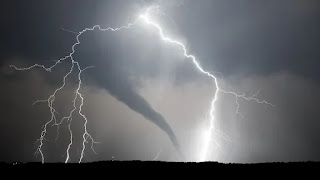** Please give to the relief effort for these communities which lost so much. More importantly choose your form of help carefully. See more information about how to give below.
 |
| Getty Image (General) |
Forty couple years ago, I lived in Starkville, Mississippi and saw my first tornado. In the light of day, this barely moving chubby rotation was more a nuisance than a danger. I was at work and stood in the parking lot watching its ghost-like shape move about 50 yards away. As it passed and disappeared into the pines that graced both sides of the highway, I heard the intermittent sound of breaking tree limbs. I knew I was not in any real danger and went along with my day. This was not the type of tornado that hit six Midwest states on the evening of December 10, 2021.
In much the same way that other parts of the country deal with Clipper system snowstorms or severe thunderstorms, tornadoes are a frequent occurrence that residents just live with. Most are the chubby, poorly formed versions that cause some damage but not massive casualties. But at night, a tornado is more dangerous first because it means it is strong enough to survive the cooling off of sundown and second because residences cannot anticipate the path of the storm. These residents had been well informed but at that speed and over that distance there was little hope anything in its path would remain standing even for the well-prepared.
As the news of the events rolled across my news feed, the media ramped up the donation and calls for action. Not understanding that this was already a recovery operation before the news even hit the air, media created a scam artists paradise of opportunity to bilk caring people out of their donations. Before rushing to click on any and every donate button that comes across your phone or email account, take some time to explore the CRT (not that other CRT issue) method of giving: use CAUTION, do some RESEARCH and give over TIME. Consider the information below as well before giving.
1. Disasters come on quickly but recovery takes time. If a charity wants money now, back off and research that option. Be cautious of large corporations and businesses that operate within the damaged zone. Giving to the relief effort through them might be considered a conflict of interest and become murky as time goes by. Understand that you are giving freely with no strings attached when giving money to any for-profit business. There is no limit to the amount of time such businesses can hold on to your money and with a bit of creative book keeping, each of these businesses can profit greatly from your generosity.
2. Even top quality charities have costs. Before giving research how much of your money will actually go to the cause rather than supporting the organization. My rule of thumb is that if the CEO makes more in a year than I would make in ten years, its not a good choice for where to put my money. Consider giving locaally, rather than through the national organization. Also, if the charity advertises regularly for funds, question whether their focus is on fundraising or charitable work. It is unlikely that a media outlet will give free advertising to every charity seen on their platform.
3. State and local government managed relief funds for disasters are something new. Rising from the ineffective operations of FEMA and other nationally-based charitable sources, time will tell whether they serve the people well. On the plus side, they have fewer restrictions than private non-profit groups that are bound by long standing business models.
4. Be patient. Unless you are experienced in this type of recovery or know someone personally, stay home and wait for the dust to settle. As relief efforts unfold, unique and more personal opportunities will become available. After a few weeks, consider doing some research and adopting a school, day care or other public service that was destroyed. Even with insurance and FEMA help there will always be something that would be appreciated. A trophy case that was smashed, checks to the school cafeteria to help supply lunches to suddenly unemployed families, a new set of books for a library and the list can go on and on. Direct giving may take some time but may be far more satisfying. Remember, this impacted a whole region, resources will be limited for the short term and outside funding can help in ways that other systems cannot.
5. Avoid GoFundMe accounts and sites that show up as "AD" in Google or other search engines. The only way to stop scammers is to be exceedingly cautious even if your heart aches for the victims.
Like any community, these towns will be changed forever but not necessarily disappear because of this tragedy. The time for help will be weeks from now when the media goes away and the insurance checks have been issued. Regrettably, sellers will take advantage of this situation and the money will not go as far as it should. Help will be needed then as much as it is needed now. Caution, Research and Time are important for your donation to be used effectively.